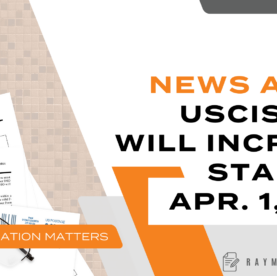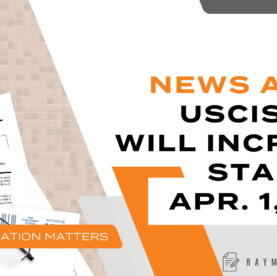USCIS Premium Processing Program Subject to New Rule in Federal Register from the DHS

Last week, the Department of Homeland Security (DHS) proposed a Rule in the Federal Register that could drastically change the premium processing program and cause delays in the otherwise timely adjudication of employer-based immigrant and non-immigrant worker petitions.
What Is Premium Processing?
Premium processing provides expedited servicing of application for certain employment-based petitions and applications. By expedited processing, USCIS guarantees a 15-calendar day processing to those petitioners or applicants for a fee of $1,440. If USCIS fails to adjudicate the petitioner or applications within the time frame, USCIS refunds the fees, but still treats the petition as premium.
What Does the DHS Want to Change?
15 “Calendar” Days to 15 “Business” Days
The DHS proposes to change the definition of “day” for 15-day processing now codified at Section 103.7(e), Title 8 of the Code of Federal Regulations, from “calendar” days to “business” days. This change would eliminate weekends and holidays as part of the premium processing date count. For purposes of calculating the 15-day premium processing clock under the proposed rule, a “business” day includes only days that the federal government is open. A “business” day does not include weekends, federally observed holidays, or days when the federal government is closed due to extraordinary circumstances, such as inclement weather.
According to the DHS, in recent years, USCIS has suspended premium processing for certain categories of employment-based petitions to permit officers to process long-pending non-premium filed petitions and to prevent a lapse in employment authorization for beneficiaries of Form I-129 extension of stay petitions. This has caused USCIS to fail in meeting the required 15-day response due to the high volume of incoming petitions and a significant surge in requests. The proposed change from 15 “calendar” days to 15 “business” days will provide USCIS additional time to complete the necessary processing on a premium processing petition and issue a decision while reducing the need for USCIS to suspend premium processing when the number of petition filings is surge.
Termination and Restart of 15-Day Clock
The DHS further proposes current premium processing regulations related to the termination and restart of the 15-day adjudication clock. A review of the current regulations, according to the DHS, has proven confusing as it includes interim actions in the list of adjudicative actions determinative of a “final decision” for the purpose of stopping the 15-day clock. As it reads, if
USCIS cannot reach a final decision on a request for which premium processing was requested, as evidenced by an approval notice, denial notice, a notice of intent to deny (NOID), or a request for evidence (RFE), USCIS will refund the premium processing service fee, but continue to process the case.
The DHS proposes an update to the regulations to provide for a refund of the premium processing fee only in the following circumstances:
- If USCIS does not take any adjudicative action within 15 business days from the date on which it accepts a properly filed request for premium processing, together with all required fees.
- If USCIS does not take subsequent adjudicative action within 15 business days from the date on which USCIS receives a response to an RFE or a NOID.
Moreover, the DHS’s proposed regulations would cause for termination of an initial 15-day processing period when USCIS takes certain adjudicative actions, specifically the notification of approval, denial, RFE, or NOID. When an RFE or NOID is issued, rather than restart the clock where it stopped, the DHS proposes to start a new 15-business day processing clock.





